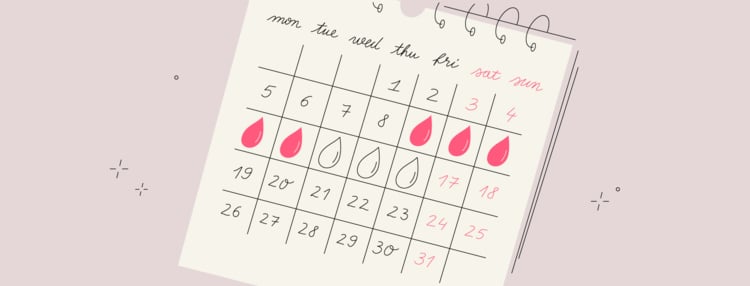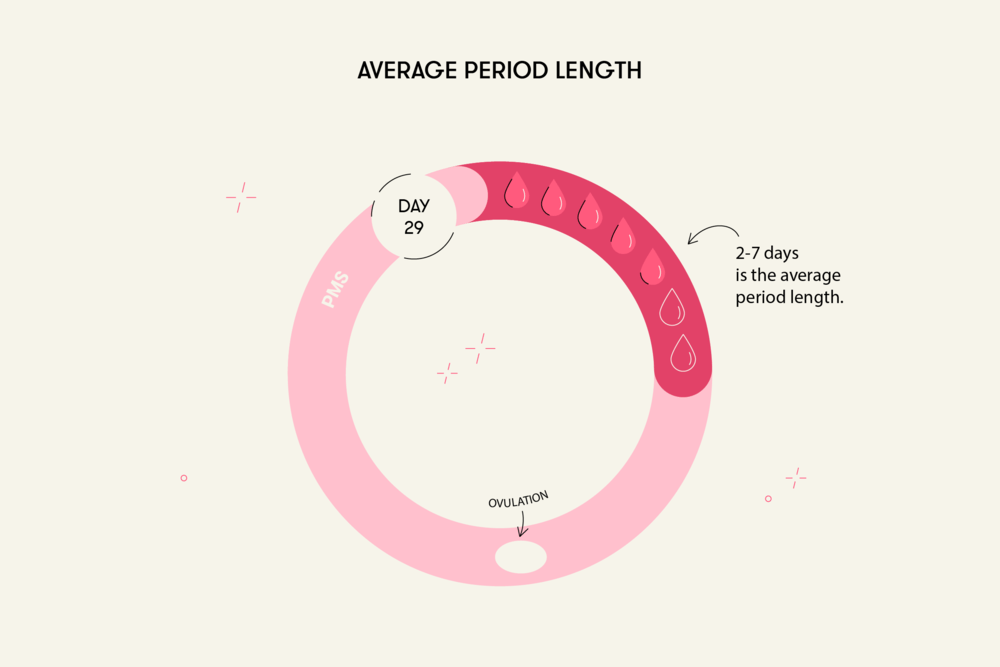It’s normal to experience variations in your menstrual cycle and periods throughout life. Jump into this article to learn how long a period usually lasts.
-
Tracking cycle
-
Getting pregnant
-
Pregnancy
-
Help Center
-
Flo for Partners
-
Anonymous Mode
-
Flo app reviews
-
Flo Premium New
-
Secret Chats New
-
Symptom Checker New
-
Your cycle
-
Health 360°
-
Getting pregnant
-
Pregnancy
-
Being a mom
-
LGBTQ+
-
Quizzes
-
Ovulation calculator
-
hCG calculator
-
Pregnancy test calculator
-
Menstrual cycle calculator
-
Period calculator
-
Implantation calculator
-
Pregnancy weeks to months calculator
-
Pregnancy due date calculator
-
IVF and FET due date calculator
-
Due date calculator by ultrasound
-
Medical Affairs
-
Science & Research
-
Pass It On Project New
-
Privacy Portal
-
Press Center
-
Flo Accuracy
-
Careers
-
Contact Us
How Long Does a Period Last? What You Need to Know About Menstruation Length


Every piece of content at Flo Health adheres to the highest editorial standards for language, style, and medical accuracy. To learn what we do to deliver the best health and lifestyle insights to you, check out our content review principles.
Before we dive in, let’s go over the difference between your menstrual cycle and your period.
The menstrual cycle is a sequence of hormonal events (including ovulation) that prepares the body for a potential pregnancy approximately once a month. Periods, on the other hand, mark the beginning of each new cycle. They happen when the inner lining of the uterus (endometrium) sheds, which causes bleeding. Both menstrual cycle length and period length vary from person to person, and it’s normal for them to vary in length for a single person too.
Menstrual cycles vary in length, but any length from 21–35 days is considered normal for adults. For the first two years you get periods, menstrual cycles can last 21–45 days and still be considered normal.
In 2020, Flo collaborated with the University of Adelaide to conduct a large study using anonymized data from our app. After studying the data of over 1.5 million people, we found that over 90 percent of people who get periods had a menstrual cycle that was 21–35 days long. Interestingly, only about 16 percent of the participants had a 28-day cycle, even though you might have been told this was the typical length for menstrual cycles.
A study carried out from 2013–2018 of the menstrual cycles of more than 98,000 women showed that the average duration was around 30 days.
Enough about menstrual cycles — how long does a period usually last? Let’s discuss the answer to this question and more.
How long does a period usually last?
It’s considered normal for periods to last 2–7 days, although they’re most often 3–5 days long. The volume of blood loss is considered normal at an average of 30–80 milliliters (about 2–5 tablespoons).
If a period lasts more than eight days or if blood loss seems to be more than 80 milliliters, it’s considered heavy menstrual bleeding. Unless you use a menstrual cup that has measurement lines on it, it’s pretty hard to know exactly how much you’re bleeding, so here are some signs to watch for:
- Blood clots the size of a quarter or larger
- Soaking through a period product every hour for several hours
- Needing to change period products in the middle of the night
- Feeling fatigued or a loss of energy
These are the main causes of prolonged bleeding:
- Uterine problems (polyps, miscarriage, ectopic pregnancy, endometriosis)
- Bleeding disorders
- Hormonal imbalance
- Copper IUD
It’s important to see your health care provider if you experience heavy and prolonged periods so you can figure out what’s causing it.
How long does a first period last?
It’s normal for a first period to last 2–7 days and be very light. In fact, you might only experience some red or brown spotting during your first periods.
In the US, the average age when people get their first periods is 12–13. Ninety-eight percent of people who get periods start having them by the time they’re 15.
Health care providers typically recommend that teenagers have their first OB-GYN visit when they’re 13–15. Most teenagers won’t need to have a pelvic exam or other invasive tests during this visit; instead, a health care provider will probably just ask some questions about their personal and family health history and perform an external physical exam.

Take a quiz
Find out what you can do with our Health Assistant
How does period length vary?
Most people know how long a period lasts for them on average by the time they’re adults. It’s normal for periods to vary in length by a day or two from cycle to cycle.
However, take notice if your periods suddenly become much shorter or longer than they were before or if your cycle becomes irregular. Contact your health care provider if:
- Your period is accompanied by intense pain.
- Your period length changes suddenly.
- Your period stops.
- You experience bleeding or spotting between periods or after intercourse.
- Your periods become heavier than usual.
- You start to feel sick after using tampons.
- You have abnormal vaginal discharge.
Takeaway
How long your period lasts can vary from cycle to cycle, and using a period tracking app like Flo can help you to keep a log of yours. Most people have periods that last 3–5 days, although anything between 2–7 days is considered normal.
It’s normal for a first period to be shorter, and it’s also perfectly normal for the first menstrual cycles to be somewhat irregular within two years after the onset. The good news is that as you become older, it’s very likely that your periods and cycles will become more regular.
If you experience noticeable variations in the length of your periods, you might want to talk to your health care provider about it.


Hey, I'm Anique
I started using Flo app to track my period and ovulation because we wanted to have a baby.


The Flo app helped me learn about my body and spot ovulation signs during our conception journey.


I vividly
remember the day
that we switched
Flo into
Pregnancy Mode — it was
such a special
moment.
Real stories, real results
Learn how the Flo app became an amazing cheerleader for us on our conception journey.
References
“Causes of Menorrhagia.” Women’s Health Medicine, vol. 2, no. 3, Elsevier BV, May 2005, p. 14. Crossref, doi:10.1383/wohm.2.3.14.67167. Walker, Matthew H., et al. “Menorrhagia.” StatPearls, U.S. National Library of Medicine, 12 June 2021, www.ncbi.nlm.nih.gov/books/NBK536910/. “Your First Gynecologic Visit.” ACOG, June 2020, www.acog.org/womens-health/faqs/your-first-gynecologic-visit. “Your First Period.” ACOG, Feb. 2019, www.acog.org/womens-health/faqs/your-first-period. “Heavy Menstrual Bleeding.” Centers for Disease Control and Prevention, 20 Dec. 2017, www.cdc.gov/ncbddd/blooddisorders/women/menorrhagia.html. “Periods.” NHS Inform, 12 Mar. 2020, www.nhsinform.scot/illnesses-and-conditions/sexual-and-reproductive/periods. “Periods and Fertility in the Menstrual Cycle.” Nhs Choices, NHS, 5 Aug. 2019, www.nhs.uk/conditions/periods/fertility-in-the-menstrual-cycle/. Grieger, Jessica A, and Robert J Norman. “Menstrual Cycle Length and Patterns in a Global Cohort of Women Using a Mobile Phone App: Retrospective Cohort Study.” Journal of medical Internet research vol. 22,6 e17109. 24 Jun. 2020, doi:10.2196/17109 Faust, Louis et al. “Findings from a mobile application-based cohort are consistent with established knowledge of the menstrual cycle, fertile window, and conception.” Fertility and sterility vol. 112,3 (2019): 450-457.e3. doi:10.1016/j.fertnstert.2019.05.008 Bull, Jonathan R et al. “Real-world menstrual cycle characteristics of more than 600,000 menstrual cycles.” NPJ digital medicine vol. 2 83. 27 Aug. 2019, doi:10.1038/s41746-019-0152-7 Reed, Beverly and Bruce Carr. “The Normal Menstrual Cycle and the Control of Ovulation.” NCBI, U.S. National Library of Medicine, 5 August 2018, https://www.ncbi.nlm.nih.gov/books/NBK279054/ Thiyagarajan, Dhanalakshmi et al. “Physiology, Menstrual Cycle.” NCBI, StatPearls Publishing LLC, 17 September 2020, https://www.ncbi.nlm.nih.gov/books/NBK500020/ Munro, Malcolm et al. “The two FIGO systems for normal and abnormal uterine bleeding symptoms and classification of causes of abnormal uterine bleeding in the reproductive years: 2018 revisions.” International Journal of Gynecology & Obstetrics, vol. 143, no. 3, 10 September 2018, pp. 393-408. Obstetrics & Gynecology, https://obgyn.onlinelibrary.wiley.com/doi/10.1002/ijgo.12666 “Screening and Management of Bleeding Disorders in Adolescents With Heavy Menstrual Bleeding.” ACOG Clinical, The American College of Obstetricians and Gynecologists, September 2019, https://www.acog.org/clinical/clinical-guidance/committee-opinion/articles/2019/09/screening-and-management-of-bleeding-disorders-in-adolescents-with-heavy-menstrual-bleeding “Heavy Menstrual Bleeding.” Centers for Disease Control and Prevention, U.S. Department of Health & Human Services, 20 December 2017, https://www.cdc.gov/ncbddd/blooddisorders/women/menorrhagia.html Lacroix, Amy et al. “Physiology, Menarche.” NCBI, StatPearls Publishing LLC, 27 March 2021, https://www.ncbi.nlm.nih.gov/books/NBK470216/ “Menstruation in Girls and Adolescents: Using the Menstrual Cycle as a Vital Sign.” ACOG Clinical, The American College of Obstetricians and Gynecologists, December 2015, https://www.acog.org/clinical/clinical-guidance/committee-opinion/articles/2015/12/menstruation-in-girls-and-adolescents-using-the-menstrual-cycle-as-a-vital-sign




